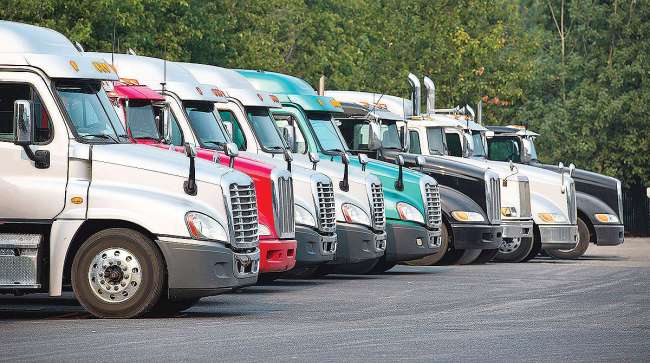Senior Reporter
House Policymakers Consider Multiyear Highway Bill

[Stay on top of transportation news: Get TTNews in your inbox.]
The Transportation and Infrastructure Committee in the U.S. House continued to debate a five-year, $494 billion highway policy bill on June 18, a day after kicking off the measure’s consideration.
The legislation would update most of the country’s freight and passenger transportation programs while promoting myriad climate change and infrastructure resilience policies.
Committee Chairman Peter DeFazio (D-Ore.), who sponsored the bill, titled the INVEST in America Act, allowed debate on more than 200 amendments that ranged from establishing fees on alternative technologies to safety-centric provisions on trucks and buses.
For too long, Congress has failed to address our infrastructure crisis, ultimately leaving our roads, bridges, transit, & rail systems outdated, & in some places dangerous. It's time to change that.
The INVEST in America moves us forward and tackles our infrastructure crisis. pic.twitter.com/mI2Se0aDNV — Committee on Transportation and Infrastructure (@TransportDems) June 18, 2020
Lawmakers are expected to approve the bill largely along party lines. The measure would then move on to the House floor, where leaders have indicated they intend to debate it this month.
“This legislation creates millions of family-wage jobs, supports American manufacturing and restores U.S. competitiveness. By putting people to work on transformative projects in urban, suburban and rural communities across the country, this legislation invests in jobs that can’t be exported,” said DeFazio on June 17.
Addressing climate change, the chairman added: “The INVEST in America Act take[s] a bold and comprehensive approach to meeting this challenge. These provisions will mean less time stuck in traffic, new jobs in the clean energy economy, more choices for travelers, cleaner air for our communities and better quality of life.”
At the start of the hearing, DeFazio received pushback from Republicans on the panel led by ranking member Rep. Sam Graves (R-Mo.) who described the bill as partisan, taking issue with its climate change focus.
Highway Bill 0622 Eu Pw by Transport Topics on Scribd
“We’re not marking up a bipartisan ‘highway bill’ today — we’re marking up the majority’s ‘My Way or the Highway Bill.’ Maybe that was inevitable, given the partisan agenda the Speaker [Nancy Pelosi] has been pursuing throughout this Congress,” said Graves on June 17.
In a sign of the times, concerns related to the coronavirus pandemic motivated many lawmakers to participate remotely via online tools. Several members who attended the hearing on Capitol Hill wore masks and sat 6 feet apart.
The bill is meant to reauthorize the 2015 FAST Act highway law, which expires at the end of September. Last year, the Senate Environment and Public Works Committee proposed severe-weather resilience for construction projects and streamlining environmental permitting regulations as part of its five-year, $287 billion version.
A long-term funding strategy for the Highway Trust Fund, an account that assists states with projects, is missing from both bills. The congressional tax-writing committees have yet to consider a fix for the fund, which relies on dwindling revenue from the federal fuel tax. The 24.4 cents-per-gallon diesel tax and 18.4 cents-per-gallon gas tax have remained unchanged since 1993.
The bill would also direct the secretary at the U.S. Department of Transportation to delay a new Federal Motor Carrier Safety Administration hours-of-service rule for commercial drivers until a comprehensive review of its waivers, exemptions and related guidelines is finalized.
A safety impact analysis in consultation with state enforcement agencies, as well as a driver impact analysis, would be needed for the review. Findings resulting from the review also would need to appear in the Federal Register within 18 months of the start of the review, while the public would be allowed to comment on the findings and a report about the review would be issued to Congress. The report’s details would need to appear on DOT’s website.
An amendment from Rep. Mike Bost (R-Ill.) that would have eliminated this provision was defeated by the panel.
The HOS rule takes effect Sept. 29 and will allow additional flexibility for drivers’ required 30-minute rest breaks by permitting a break after eight hours of consecutive driving to be satisfied by a driver using “on-duty, not driving” status, rather than “off-duty” status.
The measure also proposes $250 million for building and enhancing truck parking facilities, and would require the secretary to prioritize reinstating public display of safety data for motor carriers.

COVID-19 has placed significant strain on many freight networks. So how are third-party logistics providers adapting to meet these challenges? Host Seth Clevenger chats with two 3PL executives who have had firsthand experience contending with this crisis. Hear a snippet, above, and get the full program by going to RoadSigns.TTNews.com.
Members also approved an amendment from Rep. Jesus “Chuy” Garcia (D-Ill.) that would increase from $750,000 to $2 million the minimum amount of liability insurance commercial motor vehicles are required to maintain.
Overall, the House bill, as amended, would provide $319 billion for the federal-aid highway program at the Federal Highway Administration. The Federal Transit Administration would receive $105 billion and the National Highway Traffic Safety Administration would get $5.3 billion.
Natso, a group representing travel plazas and truck stops, decried omissions from the measure.
“This is the first time in Natso’s 60-year history that we have opposed a federal highway bill,” said Lisa Mullings, president and CEO of Natso. “We want to see smart policies to incentivize our members to invest in electric vehicle charging infrastructure. That is why we must oppose this bill.”
Other transportation groups have urged Congress to approve long-term highway funding plans. American Trucking Associations, for instance, has repeatedly called on Congress to adopt a 20-cents-per-gallon fee on motor fuels collected at the wholesale rack that would be phased in over four years.
Want more news? Listen to today's daily briefing:
Subscribe: Apple Podcasts | Spotify | Amazon Alexa | Google Assistant | More

